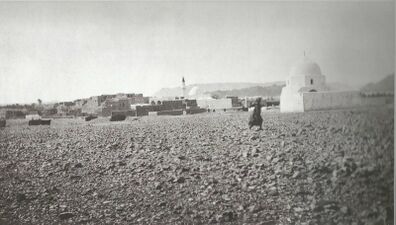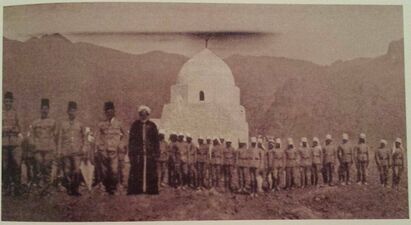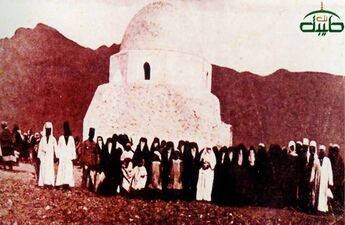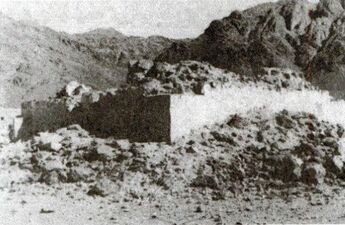Al-Thanaya Mosque
Al-Thanaya Mosque or al-Thanaya Dome (Arabic: مسجد الثنايا or قبة الثنايا) was one of the old mosques in Medina, which was built at the place where the Prophet's teeth were broken in the Battle of Uhud. This mosque was located in the north direction of the tomb of the martyrs of Uhud, near the mountain of Uhud, but today there is no trace of it.
Story
There is no mention of this mosque in the old history and geography texts of Medina. But newer sources have indicated the existence of a mosque on Mount Uhud, which was built at the place where the Prophet's incisors teeth were broken in the Battle of Uhud.[1]
Reports from the End of the 13th/18th Century
According to the report of Muhammad Rida Tabataba'i Tabrizi in 1296/1878-9, this mosque was located 150 steps away from the grave of the martyrs of Uhud.[2]
Hisam al-Saltana, who went to hajj in 1297/1879-80, reports that he entered the al-Thanaya Mosque and prayed there. According to him, this mosque had a small courtyard and a dome, and it was located in the north direction, above the shrine of Hamza b. Abi Talib. [3]
According to another report, this mosque was rebuilt in 1303/1885-6.[4]
Ibrahim Raf'at Pasha saw this mosque in 1319/1901-2 and spoke about it as follows: near the graves of the martyrs, there is a water spring called 'Ayn Al-Thanaya which can be reached by a few steps. There is the al-Thanaya Dome.[5] He has published two pictures of this dome in his book.[6]
Destruction
Because this mosque was located in the middle of a valley and in the path of the flowing water that flowed from Mount Uhud in winter and spring, over time, its dome collapsed and only the walls around the building remained. After a while, due to its lack of reconstruction, It was completely destroyed.[7] Sayyid Ahmad Yasin Khayari (b. 1321/1903-4 - d. 1380/1960-1) confirmed in his book that the dome of al-Thanaya Mosque was destroyed and there were only remains of its building.[8]
According to the report of Rasul Ja'fariyan in 1416/1995-6 there was no trace of this mosque in the place.[9]
Gallery
-
The first image published by Ebrahim Rafat Pasha in his book Mir'at al-haramayn. This photo was taken in 1319/1901-2.
-
The second image published by Ebrahim Rafat Pasha in his book Mir'at al-haramayn. This photo was taken in 1319/1901-2..
Notes
- ↑ Ibn Hishām, al-Sīra al-Nabawīyya, vol. 2, p. 80.
- ↑ Ṭabāṭabāʾī Tabrīzī, Hidāyat al-ḥujjāj, p. 213.
- ↑ Ḥisām al-Salṭana. Safarnāma-yi Makka, p. 154.
- ↑ ʿAlī b. Mūsā, Rasāʾil fī tārīkh al-Madīna, p. 14.
- ↑ Rafʿat Pāshā, Mirʾāt al-ḥaramayn, p. 393.
- ↑ Rafʿat Pāshā, Mirʾāt al-ḥaramayn, p. 599.
- ↑ Kaʿkī, ʿAbd al-ʿAzīz. Maʿālim al-Madīna al-munawwara, vol. 1: al-Jibal, p. 186.
- ↑ Khayārī, Tārīkh maʿālim al-Madīna al-munawwara, p. 192.
- ↑ Jaʿfarīyān, Āthār-i Islāmī-yi Makka wa Madīna, p. 433.
References
- ʿAlī b. Mūsā. Rasāʾil fī tārīkh al-Madīna. Riyadh: Dār al-Yamāma, [n.d].
- Ibn Hishām, ʿAbd al-Malik. Al-Sīra al-Nabawīyya. Edited by Muṣṭafā al-Saqqā, et. al. Cairo: 1355/1936.
- Jaʿfarīyān, Rasūl. Āthār-i Islāmī-yi Makka wa Madīna. Tehran: Mashʿar, 1382Sh.
- Kaʿkī, ʿAbd al-ʿAzīz. Maʿālim al-Madīna al-munawwara bayn al-ʿimāra wa l-tārīkh, part 1: al-Maʿālim al-Ṭabīʿīyya, vol. 1: al-Jibāl, Beirut: Muʾallif, 1419AH.
- Khayārī, Sayyid Aḥmad Yāsīn al-. Tārīkh maʿālim al-Madīna al-munawwara qadīman wa ḥadīthan. Riyadh: al-Amāna al-ʿāmma li-l-iḥtifāl miʾat ʿām ʿalā l-taʾsīs al-Mamlaka al- ʿArabīyya al-Suʿūdīyya, 1419/1999.
- Rafʿat Pāshā, Ibrāhīm. Mirʾāt al-ḥaramayn. Cairo: Dār al-Kutub al-Miṣrīyya, 1925.
- Ḥisām al-Salṭana. Safarnāma-yi Makka. Edited by Rasūl Jaʿfarīyān. Tehran: Mashʿar, 1374Sh.
- Ṭabāṭabāʾī Tabrīzī, Muḥammad Riḍā. Hidāyat al-ḥujjāj. Qom: Muwarrikh, [n.d].



